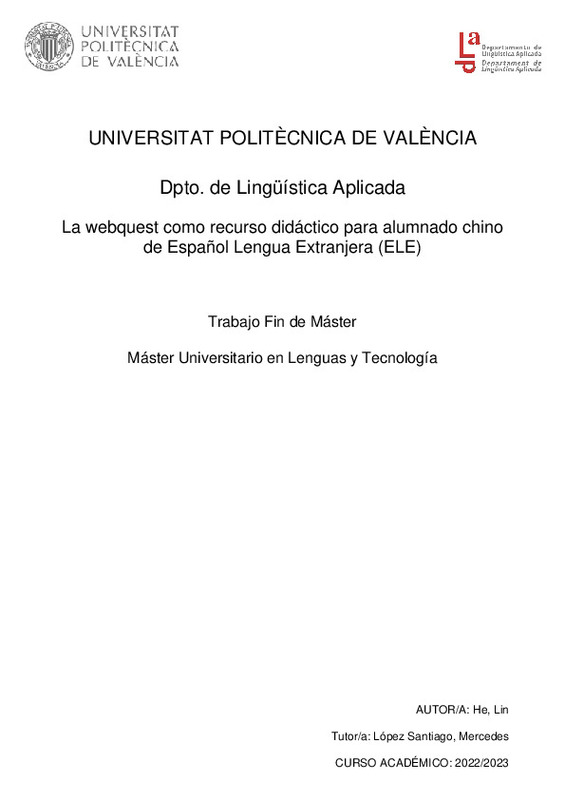JavaScript is disabled for your browser. Some features of this site may not work without it.
Buscar en RiuNet
Listar
Mi cuenta
Estadísticas
Ayuda RiuNet
Admin. UPV
La webquest como recurso didáctico para alumnado chino de Español Lengua Extranjera (ELE)
Mostrar el registro sencillo del ítem
Ficheros en el ítem
| dc.contributor.advisor | López Santiago, Mercedes
|
es_ES |
| dc.contributor.author | He, Lin
|
es_ES |
| dc.date.accessioned | 2023-10-24T11:16:38Z | |
| dc.date.available | 2023-10-24T11:16:38Z | |
| dc.date.created | 2023-09-28 | |
| dc.date.issued | 2023-10-24 | es_ES |
| dc.identifier.uri | http://hdl.handle.net/10251/198679 | |
| dc.description.abstract | [ES] Con el desarrollo de los intercambios internacionales, el comercio y la economía entre China y España, así como entre China y países de Latinoamérica, el español se ha convertido en un importante instrumento de comunicación. Por esta razón, la enseñanza del español como lengua extranjera (ELE) en China ocupa un lugar destacado. En el aula de ELE en China, la enseñanza se basa en el método tradicional de gramática y traducción, con el uso de la memoria para aprender el vocabulario; y en pocas ocasiones se complementa con herramientas TIC. En este contexto, se presenta en este TFM una propuesta didáctica basada en el uso de la webquest en el aula de ELE para alumnado chino. La webquest se fundamenta en el constructivismo y en el aprendizaje colaborativo. Por ello, se propone una tarea en grupo con el fin de aprender español. El tema de la webquest propuesta es una fiesta española muy famosa, las Fallas. Como todas las fiestas, esta fiesta valenciana resulta atractiva porque provoca la curiosidad de los estudiantes chinos. A través de esta webquest, los estudiantes desarrollan habilidades de investigación, análisis, presentación y trabajo en equipo; y no solo mejoran sus habilidades y competencias en español, sino que también amplían sus conocimientos sobre la cultura española. En efecto, después de la prueba piloto, en el cuestionario de valoración se recoge la satisfacción y gran aceptación de la webquest para aprender español. En definitiva, el uso de la webquest en la enseñanza de ELE facilita el aprendizaje de los estudiantes chinos porque estimula su interés, tanto por la lengua como por la cultura española. | es_ES |
| dc.description.abstract | [EN] With the development of international exchanges, trade and economy between China and Spain, as well as between China and Latin American countries, Spanish has become an important communication tool. For this reason, the teaching of Spanish Foreign Language (ELE) in China occupies a prominent place. In the ELE classroom in China, teaching is based on the traditional method of grammar and translation, with the use of memory to learn vocabulary; and is rarely complemented with ICT tools. In this context, this TFM presents a didactic proposal based on the use of the webquest in the ELE classroom for Chinese students. The webquest is based on constructivism and collaborative learning. Therefore, a group task is proposed to learn Spanish. The subject of the proposed webquest is a very famous Spanish festival, Las Fallas. Like all festivals, this Valencian festival is attractive because it provokes the curiosity of Chinese students. Through this webquest, students develop research, analysis, presentation and teamwork skills; and not only improve their Spanish skills and competences, but also broaden their knowledge about Spanish culture. In fact, after the pilot test, the evaluation questionnaire shows the satisfaction and great acceptance of the webquest for learning Spanish. In short, the use of the webquest in teaching Spanish Foreign Language facilitates the learning of Chinese students because it stimulates their interest in the language and Spanish culture. | es_ES |
| dc.format.extent | 97 | es_ES |
| dc.language | Español | es_ES |
| dc.publisher | Universitat Politècnica de València | es_ES |
| dc.rights | Reconocimiento - No comercial - Sin obra derivada (by-nc-nd) | es_ES |
| dc.subject | Aprendizaje de lenguas extranjeras | es_ES |
| dc.subject | Enseñanza de lenguas extranjeras | es_ES |
| dc.subject | Language learning | es_ES |
| dc.subject | Español como Lengua Extranjera (ELE) | es_ES |
| dc.subject | Webquest | es_ES |
| dc.subject | Alumnado chino. | es_ES |
| dc.subject | Teaching | es_ES |
| dc.subject | Learning | es_ES |
| dc.subject | Chinese students. | es_ES |
| dc.subject | Spanish as a Foreign Language (SFL) | es_ES |
| dc.subject | Foreign Language Teaching (FLT) | es_ES |
| dc.subject | Foreign Language Learning (FLL) | es_ES |
| dc.subject.classification | FILOLOGIA FRANCESA | es_ES |
| dc.subject.other | Máster Universitario en Lenguas y Tecnología-Màster Universitari en Llengües i Tecnologia | es_ES |
| dc.title | La webquest como recurso didáctico para alumnado chino de Español Lengua Extranjera (ELE) | es_ES |
| dc.title.alternative | The webquest as a teaching resource for chinese students of Spanish Foreign Language (ELE) | es_ES |
| dc.title.alternative | La webquest como a recurs didàctic per a alumnat xinés d'Espanyol Llengua Estrangera (ELE) | es_ES |
| dc.type | Tesis de máster | es_ES |
| dc.rights.accessRights | Abierto | es_ES |
| dc.contributor.affiliation | Universitat Politècnica de València. Departamento de Lingüística Aplicada - Departament de Lingüística Aplicada | es_ES |
| dc.description.bibliographicCitation | He, L. (2023). La webquest como recurso didáctico para alumnado chino de Español Lengua Extranjera (ELE). Universitat Politècnica de València. http://hdl.handle.net/10251/198679 | es_ES |
| dc.description.accrualMethod | TFGM | es_ES |
| dc.relation.pasarela | TFGM\159154 | es_ES |






